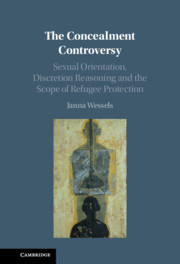 The Concealment Controversy
The Concealment Controversy Acts or Identity – Invariably ‘Discreet’
Published online by Cambridge University Press: 19 July 2021
Research on the common law jurisdictions has described ‘discretion’ reasoning as an ‘adaptive phenomenon’, that is ‘extraordinarily widespread, resistant to challenge and strongly associated with high rejection rates’. Likewise, this is reflected in those high-level European judgments that rejected a ‘discretion’ requirement. They maintained ‘discretion’ logics by allowing for a ‘factual’ finding that a claimant ‘will’ maintain secrecy. This study of asylum judgments concerning sexuality-based claims in Germany, France and Spain suggests that the same conclusions are true of these three civil law jurisdictions.
To save this book to your Kindle, first ensure no-reply@cambridge.org is added to your Approved Personal Document E-mail List under your Personal Document Settings on the Manage Your Content and Devices page of your Amazon account. Then enter the ‘name’ part of your Kindle email address below. Find out more about saving to your Kindle.
Note you can select to save to either the @free.kindle.com or @kindle.com variations. ‘@free.kindle.com’ emails are free but can only be saved to your device when it is connected to wi-fi. ‘@kindle.com’ emails can be delivered even when you are not connected to wi-fi, but note that service fees apply.
Find out more about the Kindle Personal Document Service.
To save content items to your account, please confirm that you agree to abide by our usage policies. If this is the first time you use this feature, you will be asked to authorise Cambridge Core to connect with your account. Find out more about saving content to Dropbox.
To save content items to your account, please confirm that you agree to abide by our usage policies. If this is the first time you use this feature, you will be asked to authorise Cambridge Core to connect with your account. Find out more about saving content to Google Drive.